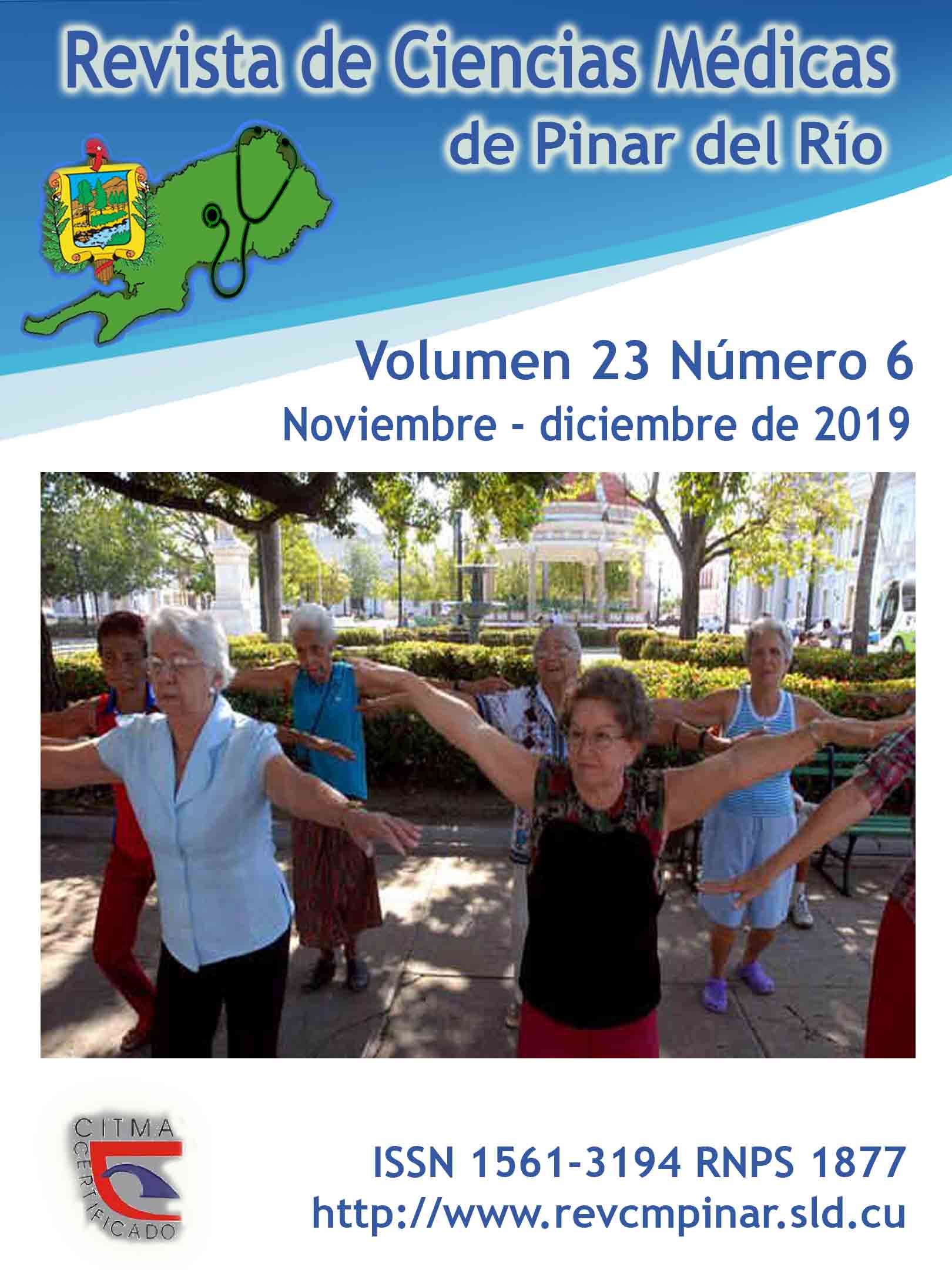The training in the university of healthy lifestyles promoters
Keywords:
FORMATION, HEALTHY LIFESTYLE, EDUCATION, HIGHER, SCIENCE, TECHNOLOGY.Abstract
Introduction: an analysis is presented concerning the role of training promoters of healthy lifestyles in the development of university students and its relationship with the up to date growth of science and technology.
Objective: to propose a pedagogical concept for the training of promoters of healthy lifestyle in the University.
Methods: the dialectic - materialist method that is considered a theoretical, practical and methodological support of the research process, as well as the historical - logical and the systemic - structural method were applied.
Results: the theoretical bases of the research that are framed from the Educational Sciences are stated, along with the legal framework in which it is based.
Conclusions: the term healthy lifestyle was approached, taking into account its implication in the training of professionals, throughout the university extension work as a formative process where the experience is consolidated.
Downloads
References
1. Díaz-Canel M. La universidad por un mundo mejor. Conferencia inaugural del VII Congreso Internacional de Educación Superior Universidad; 2010.
2. Alarcón R. La universidad socialmente responsable. Conferencia inaugural del IX Congreso internacional de Educación Superior Universidad 2014. La Habana; 2014.
3. Núñez Jover J. La Ciencia y Tecnología como procesos sociales. La Habana: Editorial Félix Varela; 1999.
4. Red Española de Universidades Saludables (REUS). La Universidad como entorno promotor de salud. [Internet] abril de 2016 [citado 01/09/2019]. Disponible en: https://www.unisaludables.es/es/
5. Otáñez Ludick JE. Efectos de los estilos de vida saludables en las habilidades sociales en jóvenes. VERTIENTES Revista Especializada en Ciencias de la Salud [Internet]. 2017 [citado 01/09/2019]; 20(2): [aprox. 6p.]. Disponible en: http://www.revistas.unam.mx/index.php/vertientes/article/download/67161/59021
6. Duarte-Cuervo CY. Comprensión e implementación de la promoción de la salud en instituciones de educación superior en Colombia. Rev. Salud Pública. [Internet]. 2015 [citado 01/09/2019]; 17(6): [aprox. 12p.]. Disponible en: http://dx.doi.org/10.15446/rsap.v17n6.44713
7. González CS, Gómez del Río N, Navarro-Adelantado V. Programa de intervención educativa para el tratamiento de la obesidad infantil basado en videojuegos activos. Revista da FAEEBA - Educação e Contemporaneidade [Internet]. 2016 [citado 01/09/2019]; 25(47): [aprox. 20p.]. Disponible en: http://revistas.uneb.br/index.php/faeeba/article/view/4577/2859
8. Diego-Cordero R, Fernández-García E, Badanta Romero B. Uso de las TIC para fomentar estilos de vidas saludables en niños/as y adolescentes: el caso del sobrepeso. Revista Española de Comunicación en Salud, RECS [Internet]. 2017 [citado 01/09/2019]; 8(1): [aprox. 8p.]. Disponible en: https://e-revistas.uc3m.es/index.php/RECS/article/view/3607
9. Sancassiani F, Pintus E, Holte A, Paulus P, Moro MF, Cossu G, et al. Enhancing emotional and social skills of the youth to promote their wellbeing and positive development: A systematic review of universal school-based randomized controlled trials. Clinical Practice & Epidemiology in Mental Health [Internet]. 2015 [citado 01/09/2019]; 11(Suppl M2): [aprox. 19p.]. Disponible en: https://www.ncbi.nlm.nih.gov/pubmed/25834626
10. Cecilia MJ, Atucha NM, García-Esta J. Educ Estilos de salud y hábitos saludables en estudiantes del Grado en Farmacia Med [Internet]. 2018 [citado 01/09/2019]; 19(S3): [aprox. 8p.]. Disponible en: https://www.elsevier.es/es-revista-educacion-medica-71-articulo-estilos-salud-habitos-saludables-estudiantes-S1575181317301468
11. López-Belmonte J, Pozo-Sánchez S, Fuentes-Cabrera A, Fuentes-Cabrera PÁ. Liderazgo de un grupo de trabajo saludable en una cooperativa educativa. Magis. Revista Internacional de Investigación en Educación [Internet]. 2019 [citado 01/09/2019]; 12(24): [Aprox. 15p.]. Disponible en: https://scholar.google.es/scholar?hl=es&as_sdt=0%2C5&q=Liderazgo+de+un+grupo+de+trabajo+saludable+en+una+cooperativa+educativa.+Magis.&btnG=
12. González M. Un modelo de gestión del proceso extensionista en la Universidad de Pinar del Río. Tesis en opción al título de Dr. en Ciencias de la Educación. La Habana; 2002.
13. González GR. Gestión de la extensión universitaria. Una propuesta desde la Universidad de Pinar del Río. Ponencia presentada en el Congreso Universidad. La Habana; 2002.
Published
How to Cite
Issue
Section
License
Authors who have publications with this journal agree to the following terms: Authors will retain their copyrights and grant the journal the right of first publication of their work, which will be publication of their work, which will be simultaneously subject to the Creative Commons Attribution License (CC-BY-NC 4.0) that allows third parties to share the work as long as its author and first publication in this journal are indicated.
Authors may adopt other non-exclusive license agreements for distribution of the published version of the work (e.g.: deposit it in an institutional telematic archive or publish it in a volume). Likewise, and according to the recommendations of the Medical Sciences Editorial (ECIMED), authors must declare in each article their contribution according to the CRediT taxonomy (contributor roles). This taxonomy includes 14 roles, which can be used to represent the tasks typically performed by contributors in scientific academic production. It should be consulted in monograph) whenever initial publication in this journal is indicated. Authors are allowed and encouraged to disseminate their work through the Internet (e.g., in institutional telematic archives or on their web page) before and during the submission process, which may produce interesting exchanges and increase citations of the published work. (See The effect of open access). https://casrai.org/credit/



